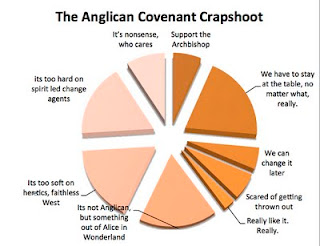Yes, well sort of, kind of, conditional consents begin to arrive.
Communion leadership displaying impatience with the processes in the Anglican Communion has proclaimed that the current "draft" of the so-called "covenant" the "final document." Sending it to the provinces, the message was take it or leave it. To say the least this is not working out. The provinces are clearly not buying the whole thing even when they somehow attempt to accept something.
New Zealand and Japan seem to have accepted, provisionally, three quarters of the thing. The onerous section four is not approved. It is not clear where in the "two tier" system the leadership seems to embrace that leaves them.
In what can only be called Pyhrric victories1, the so-called "covenant" was "approved" in two provinces over the last few weeks. In the case of Ireland, the "approval" is so conditioned that it does not apply to Ireland! In the case of the Province of South East Asia, the approval is in the context of an extensive document that directly contradicts what the document's authors and supporters say it contains.
Ireland noted in "subscribing" that it did so only to the extent the constitution, assemblies, and canons of the Irish Church were and remain superior. This makes sense only if someone else is supposed to be subordinated. In plain English (or perhaps plain Irish) that means they approved "spank the yank / Canadian" not the "covenant."
South East Asia offered an extensive and well written explanation and history that discusses what they think they are agreeing to accept. I have quoted parts here:2.
15. The Anglican Communion Covenant offers a concrete platform in ordering the Churches in the Anglican Communion to be a Communion with a clear ecclesial identity. This is why global South Churches embraced the concept of the Anglican Communion Covenant when it was first proposed (South-to-South Encounter, Third Trumpet, 22). {Emphasis mine}Oh really? For the first 150 years the only function of the Lambeth Conference was to "advise." There has never been any agreement that the communion may "order" anything.
Supporters would have us believe the "covenant" is neutral, and non-juridical. Here again South East Asia's "affirmation" of the Covenant.
We regret the decisions of the Archbishop of Canterbury and the Secretary General to include TEC members in the Standing Committee, despite Mary Glasspool’s consecration (para 12).To these folks the intended effect is clearly simillar to what Pope Benedict 16 promised the cardinals upon his election: a smaller and more in-line communion.
Finally, the first three articles and the various equivocations from the defenders all claim the draft is not attacking autocephalous standing. And yet in affirming the document, South East Asia clearly asserted a right to interfere in the most intrusive ways. They think the covenant should lead to their ability to dictate how Canada and England choose bishops!
The Anglican Communion should adopt more uniform processes in the election and appointment of bishops, to ensure that such processes are not held hostage to local politics and to parochial understandings of the episcopal office.South East Asia's guidance on how to select bishops is not likely to be welcome in England, nor will Canada, USA, nor even Uganda seek it. Each church thinks its process quite fine and consistent with the Quadrilateral3.
The effect of utterly unrealistic expectations; Ireland thinks it remains autocephalous, while South East Asia thinks the "Covenant" is about "subordinating" other churches; is inevitable chaos. The "covenant" will be meaningless or worse, the cause of even greater anger. Leadership needed precisely what it rejected: more conversation, more consensus building, more diversity, and more time.
Now we can discern a growing set of conditional approvals that in aggregate amount to very little. The likely outcome of more conventions is more and more varied conditional affirmations. It is possible that Canada and USA will in spite of my and my colleagues opposition, do something like this. Consider what something like "We accept the covenant subject to our constitutional requirement to "respect the dignity of every living human person" or "the covenant is of course subject to the interpretation of General Synod" would mean in African ears!
The "covenant" effort won't hold the church together. It will lead to ever more divisive disputes over exactly what is agreed to and what is to be "subordinated" and to whom.
The smart thing to do is to note Southern objections (from the "Gafcon" primates), negative comments from the recent communion Primates' Meeting, and various partial approvals: then constitute a new group of scholars to review and revise the document. They should be asked to take a careful and very long look at it. In fact it might be a good idea to ask only for a progress report at the 2018 Lambeth Conference.
"Delay," wrote Parkinson, "is the deadliest form of denial4." Communion leadership cannot now, as they should have before say, "Sorry, bad idea!" They can however delay any further decisions until the entire process becomes, as it so richly deserves, clearly irrelevant. The communion is going to have to work out its relationships. It needs perhaps some leadership, but not an unclear, ineffective set of rules. It is time to move on from "covenant" to communion.
**********
1 A "Pyhrric Victory" is one that damages the "winner" more than it does the loser. See This link for more details.
2 The complete document is at this site.
3 See the Chicago-Lambeth Quadrilateral as one of the four elements required for unity:
The Historic Episcopate, locally adapted in the methods of its administration to the varying needs of the nations and peoples called of God into the unity of His Church.
4. C. Northcote Parkinson, The Law of Delay, 1970
Labels: analysis





